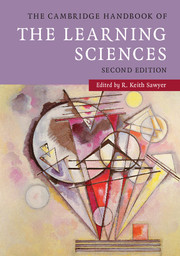
-
Select format
-
- Publisher:
- Cambridge University Press
- Publication date:
- November 2014
- November 2014
- ISBN:
- 9781139519526
- Dimensions:
- Weight & Pages:
- Dimensions:
- Weight & Pages:
You may already have access via personal or institutional login
Book description
The interdisciplinary field of the learning sciences encompasses educational psychology, cognitive science, computer science, and anthropology, among other disciplines. The Cambridge Handbook of the Learning Sciences is the definitive introduction to this innovative approach to teaching, learning, and educational technology. This dramatically revised second edition incorporates the latest research in the field, includes twenty new chapters on emerging areas of interest, and features contributors who reflect the increasingly international nature of the learning sciences. The authors address the best ways to design educational software, prepare effective teachers, organize classrooms, and use the internet to enhance student learning. They illustrate the importance of creating productive learning environments both inside and outside school, including after-school clubs, libraries, museums, and online learning environments. Accessible and engaging, the Handbook has proven to be an essential resource for graduate students, researchers, teachers, administrators, consultants, educational technology designers, and policy makers on a global scale.
Reviews
'The first edition of this Handbook was outstanding. This second edition is even more inclusive and up to date, with a choice of chapters that nicely complement one another and are written with unusual clarity. I see this as a must-read that will help all of us interested in the learning sciences move toward new levels of synthesis and application, and discover previously hidden pathways toward exciting new research issues. We owe the editor and authors a great debt of thanks for their outstanding work.'
John D. Bransford - Shauna C. Larson Professor of the Learning Sciences at the University of Washington, Emeritus
'The learning sciences is well exemplified in this very well-put-together book. There are excellent articles here about learning by argumentation, by collaboration, through projects, through cognitive apprenticeship, and in virtual words. This book demonstrates that learning scientists continue to make great progress on how learning works.'
Roger Schank - Professor Emeritus, Northwestern University, Illinois
'Too often, we educators teach in the ways that we have been taught, without regard to the research about how learning actually happens. This anthology is an invaluable contribution to a long overdue discussion about how best to ‘reinvent’ education for the twenty-first century.'
Tony Wagner - Harvard University, Massachusetts, author of The Global Achievement Gap and Creating Innovators
'In an academic landscape characterized by increasing specialization, the learning sciences stands out for its broad and interdisciplinary approach. In this highly readable and useful overview of the field, this outstanding group of authors demonstrates the power and promise of a field motivated not by the advance of a particular theory or paradigm but by a desire to understand and solve some of the most significant issues of our day - issues of education and learning in a socially and technologically complex world.'
James W. Stigler - University of California, Los Angeles
'This is a deeply rich, comprehensive handbook of the learning sciences. The volume covers an impressive array of topics - from theoretical approaches to methodologies to concrete, implementable instructional techniques. I found it to be extremely informative and accessible. Without a doubt this handbook will be an indispensable and satisfying resource for students, researchers, teachers and experts.'
Mark McDaniel - Washington University, St Louis
Contents
Metrics
Altmetric attention score
Full text views
Full text views help Loading metrics...
Loading metrics...
* Views captured on Cambridge Core between #date#. This data will be updated every 24 hours.
Usage data cannot currently be displayed.
Accessibility standard: Unknown
Why this information is here
This section outlines the accessibility features of this content - including support for screen readers, full keyboard navigation and high-contrast display options. This may not be relevant for you.
Accessibility Information
Accessibility compliance for the PDF of this book is currently unknown and may be updated in the future.


